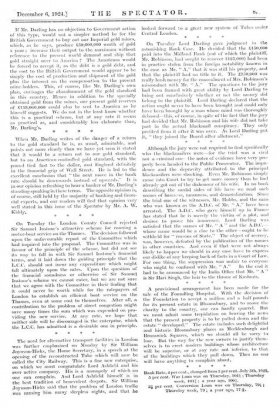Although the jury were not required to find specifically who
the blackmailers were—for the trial was a civil not a criminal one—the notes of evidence have very pro- perly been handed to the Public Prosecutor. The impu- dence and the depravity attributed to the principal blackmailers were shocking. Even Mr. Robinson simply came into Court to try to get more money than he had already got out of the dishonour of his wife. In no book describing the sordid sides of life have we read such scenes of baseness, meanness, and demoralization. Since the trial one of the witnesses, Mr. Hobbs, and the man who was known as the A.D.C. of Mr. " A," have been arrested. The A.D.C. who gave himself up in France has stated that he is merely the victim of a plot, and desires to prove his innocence. Lord Darling was satisfied that the names of Mr. " A " and the A.D.C.- whose name would be a clue to the other—ought to be withheld for " reasons of State." The object of secrecy, was, however, defeated by the publication of the names in other countries. And even if that were not always likely to happen we should in any case have to express our dislike of any keeping back of facts in a Court of Law. For one thing, the suppression was unfair to everyone who might be confused with Mr. " A." In the end it had to be announced by the India Office that Mr. " A " is Sir Hari Singh, the heir to the throne of Kashmir.


















































 Previous page
Previous page